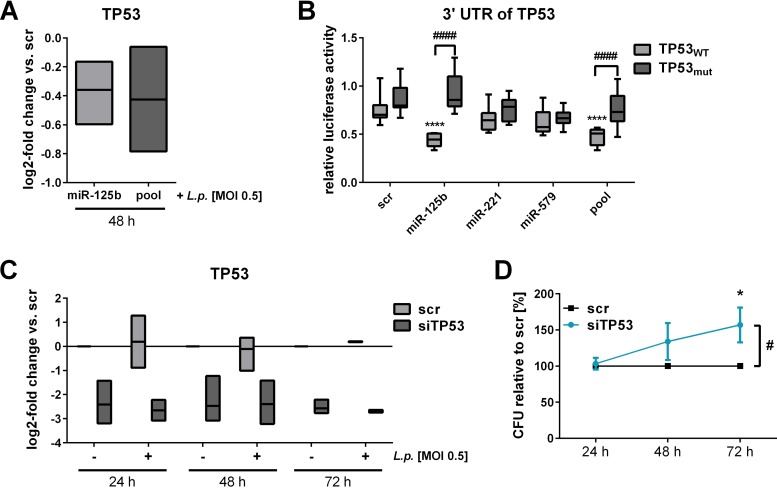FIG 7.
TP53 is targeted by miR-125b and affects L. pneumophila replication. THP-1 cells were transfected with either miRNA-125b mimic or an miRNA mimic pool (miR-125b, miR-221, and miR-579) at a final concentration of 30 nM. As a control, a scrambled precursor (scr) was transfected. At 24 h posttransfection, THP-1 cells were activated with PMA for another 24 h and then infected with L. pneumophila at an MOI of 0.5. (A) TP53 expression was examined via qPCR and is displayed as the log2 fold change. Luciferase reporter assay analyses were performed in HEK-293T cells. The plasmid contained either the wild-type (TP53WT) or the mutated (TP53mut) version of the 3′ UTR of TP53. Ratios of Renilla and firefly luciferase luminescence were normalized to the vector without insert. BDMs were transfected with an siRNA pool targeting TP53 (siTP53) or with a scrambled siRNA as a control (scr) and infected at an MOI of 0.5 or left untreated. (C) Downregulation of TP53 expression with siRNA was verified by qPCR and is displayed as the log2-fold change. (D) The CFU of Legionella were determined 24, 48, and 72 h postinfection after a knockdown of TP53. Boxes show the upper and lower quartiles with median (when n = 3 independent biological replicates) and whiskers indicate minimal and maximal values (when n = 4 independent biological replicates). A two-way ANOVA with Sidak’s correction was performed. *, P ≤ 0.05; **, P ≤ 0.01; ***, P ≤ 0.001; ****, P ≤ 0.0001 (compared to scramble). ####, P ≤ 0.0001 (compared to the wild type) (B). #, P ≤ 0.05 (for global treatment effects) (D).

